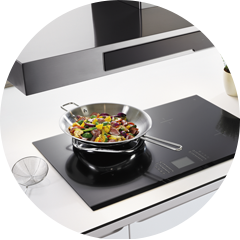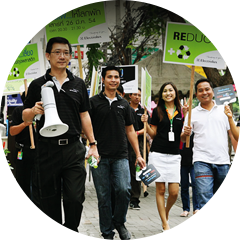Sustainability

CEO Statement
Bringing the most efficient appliances to market will increase the Group's positive impacts and grow the business. That means bringing sustainability to the core of the business strategy.

Integrating sustainability
Embedding sustainability at Electrolux is about clear leadership and vision, but also about ownership - where management drives its relevance home within their area of responsibility.
Mapping priorities
Seeing the big picture is important - it is the departure point for understanding the issues that really matter. Eleven sustainability areas critical to the business have been identified.
Performance and progress
Your guide to more information on the Group's approach, progress and priorities in dealing with the sustainability issues most relevant to the business.
Awards and recognition



Influencing the value chain
R&D
Suppliers
Electrolux
operations
Transport
Point of
purchase
Consumer use
End-of-Life
R&D
Electrolux allocated SEK 2.5bn to R&D, approximately one third of which is sustainability-related. Focus is on energy- and water-efficiency as well as use of materials. Reduction goals for energy, water and chemicals are in place for all major product categories.
Suppliers
The company's more than 3,000 suppliers must manage their sustainability performance in line with Group requirements. Audits target those in high- and medium-risk countries, esp. in China, the Ukraine, Egypt, Chile and Argentina. Focus is on building supplier capacity to maintain high standards. (Indirect impact)
Electrolux
operations
The Electrolux Foundation sets out the guiding principles: respect & diversity, ethics & integrity, safety & sustainability. The Group's factories, warehouses, offices and close to 61,000 employees must be managed accordingly. (Direct impact)
Transport
Electrolux is partnering with logistics suppliers to improve transport efficiency. Logistics makes up about 1% of the product lifecycle CO2 footprint. (Indirect impact)
Point of
purchase
Retailers are the bridge to consumer engagement. Along with energy and performance labeling, partnerships help consumers make the switch to sustainable products. (Indirect impact)
Consumer use
With the major impacts occurring during product use, product efficiency is the top priority. Refrigerator and freezer efficiency in Europe improved on average by 3% per year between 2008 and 2013. (Indirect impact)
End-of-Life
Legislation on appliance recycling is being introduced in key markets. In Europe - the region with the most comprehensive producer responsibility legislation - major appliances have to be recycled to 80% (70% for small appliances). (Indirect impact)







